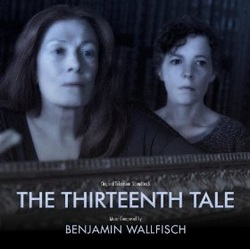
Providing spot-on accentuation for this cozy little chiller is British composer Benjamin Wallfisch. Few have managed to take the world of film music by storm as swiftly as Mr. Wallfisch, proving himself a composer to watch in one fell swoop (that "fell swoop", of course, being the outstanding Summer in February). His experience as an orchestrator and his finely-tuned sense of the dramatic have imbued him with the ability to command his ensemble on a diverse set of assignments. Truly, I cannot confess to having listened to more than one score in the same genre from him! In the last two years alone, he's tackled everything from Turkish epic to weighty, disaster-thriller to Viking actioner to period romance. Now, we can add gothic, psychological drama to that list.
As with the sleepy but effective film, Wallfisch's score transcends the expectations of "made for television". Executed with the same grace, body, and attention one might expect of a feature film score, The Thirteenth Tale adds depth and emotional weight to Vida Winter's story, balancing pensive human drama with chilling psychological horror. Employing an ensemble predominantly comprised of lush strings, woodwinds, and piano, Wallfisch establishes a soundscape of murky, overcast beauty. Much like Alejandro Amenábar's similarly-toned The Others, the composer weaves a number of themes so supple and reserved that they often glide by without drawing much attention to themselves. Make no mistake, though, this is a well-constructed journey. Beginning with rolling piano notes reminiscent of Atonement, "Opening" drops us into a state of intrigue from the start. A weightier thematic idea on strings with recorder accents comes to dominate the piece, lending the accompanying images a gloomy sense of nostalgia. "Baby Twins" bears the score's most recognizable theme, an equally nostalgic idea for the story's sisters, Isabelle and Adeline. It's a delicate, innocent piece with touches of whimsy and mild foreboding, and the frequent incarnations on recorder and piano are the highlights of the score (especially when accented by subdued choir). The theme lurks in the shadows or presents itself more forwardly in numerous cues, most prominently "Adeline Taken Away", the ominous "The Twins Separated", and "Ghost".
Wallfisch addresses the story's suspense sequences in a fairly traditional fashion, though the elegance of his writing is never lost. The lively "Margaret Flees", the chilling "Do You Believe in Ghosts?", the atmospheric "Adeline", and the rumbling "Genuinely Dangerous" all display an adeptness at varying approaches to suspense, comfortably familiar as they may be. Surely, no new ground is broken here, but an exemplary command of nuanced horror scoring is nonetheless on display.
Additional highlights of a more dramatic sort come in the form of the mournful "Isabelle", a richly melancholic piece that again utilizes Wallfisch's robust string section, the whirling, momentous "Adeline Taken Away", the more contemporary second half of "Realization", and the concluding "Wolf in the Room - End Credits". Though featuring a satisfyingly warm conclusion with hints of lingering mystery, this latter cue regrettably fizzles out too soon due to the film's hurried, television-style credits. Had The Thirteenth Tale not been bound by such constraints, Wallfisch might have been able to spin a lengthier end credits suite that better encapsulated the ideas explored in the score, ensuring a more satisfying finish for the listener. In the scheme of things, though, this is a minor critique of an impressive work and surely not the composer's fault. Given the string of successes he's been having of late, I cannot speak more highly of Mr. Wallfisch, nor can I recommend his work more enthusiastically. Though less outrightly commanding than either Summer in February or Conquest 1453, The Thirteenth Tale still stands as an effective reminder of the composer's adaptability across genres and a promising sign of things to come. If you are even vaguely interested in these sorts of subdued, gothic chillers, The Thirteenth Tale should fit nicely into your collection as a lesser sister to The Others, The Uninvited, and El Orfanato. If there's anything I learned from Vida Winter's tale, though, it's that you should always, always keep an eye out for the lesser sister.
| A Few Recommended Tracks: "Opening", "Baby Twins", "Isabelle", "Wolf in the Room - End Credits" Label: Moviescore Media Availability: 17 track edition | |

 RSS Feed
RSS Feed
